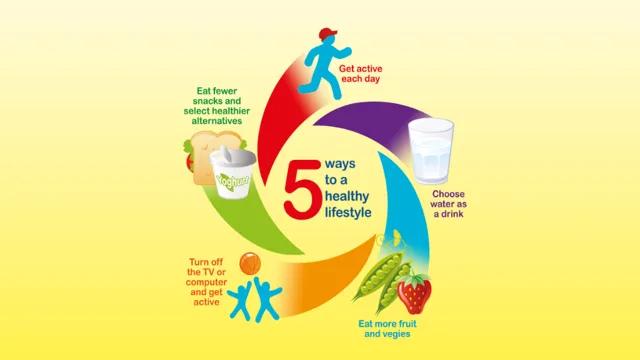As parents, we want nothing but the best for our children. That’s why we strive to provide them with everything they need to grow up happy and healthy. However, a healthy lifestyle for kids is often overlooked, as we tend to prioritize other things such as education, extracurricular activities, and socialization.
But did you know that a healthy lifestyle is just as imperative as those other priorities? In fact, a healthy lifestyle can benefit children in numerous ways –physically, emotionally, and mentally. It can impact their growth and development, boost their immune system, and enhance their overall well-being. In this blog post, we’ll delve into the importance of a healthy lifestyle for kids and how it can positively impact their future.
Introducing Healthy Habits Early
Establishing healthy habits early is crucial for kids. A healthy lifestyle article for kids can have a major impact on shaping their future health. Educating kids on the importance of nutrition, exercise, and self-care can help them develop strong and healthy bodies.
A balanced diet full of fruits, vegetables, lean proteins, and whole grains is key to maintaining good health. Encouraging kids to be physically active through sports or outdoor activities can enhance their physical development and help maintain a healthy weight. Additionally, teaching them about the importance of self-care and proper sleep habits can enhance their mental and emotional wellbeing.
By modeling healthy behaviors and establishing routines early on, kids can develop a strong foundation for lifelong healthy habits.
The Power of Positive Role Models
Introducing healthy habits early on in a child’s life is crucial in promoting positive physical and mental health. As parents, it’s our responsibility to be the positive role model in their lives and encourage good habits. This can start with simple activities such as daily walks and healthy meal choices.
By making these habits a family affair, children are more likely to adopt them and continue throughout their lives. Introducing healthy habits early on can also foster positive self-esteem and a sense of accomplishment in children. So, let’s be the example our children need and promote a healthy lifestyle that they can carry with them into adulthood.

The Risks of an Unhealthy Lifestyle
Living an unhealthy lifestyle can pose many risks to your overall health and wellbeing. From an increased risk of chronic diseases such as diabetes, heart disease, and cancer, to mental health issues such as depression and anxiety, an unhealthy lifestyle can take a toll on your mind and body. That’s why it’s essential to introduce healthy habits early on in life to establish a strong foundation for a healthy lifestyle.
By adopting healthy habits such as eating a balanced diet, getting regular exercise, practicing stress-relieving activities like meditation or yoga, and getting enough rest, you can reduce your risk of chronic diseases and improve your mental health. Encouraging these habits in children can also have a positive impact, setting them up for a healthier future. Remember, small changes can add up to make a big difference, and by taking proactive steps to establish healthy habits, you can improve your overall quality of life.
Nutrition and Healthy Eating
Eating healthy is vital for maintaining a healthy lifestyle. Ensuring kids understand the importance of good nutrition can set them up for a lifetime of healthy habits. Making smart food choices can be tricky, but it doesn’t have to be complicated.
Encourage your child to eat a variety of fruits and vegetables every day, as these provide essential vitamins, minerals, and fiber necessary for growth and development. Lean proteins, such as chicken, fish, and beans, are also important for building and repairing tissues. And don’t forget about healthy fats, found in nuts, seeds, and avocado, which promote brain health and help the body absorb essential nutrients.
Making small changes in your child’s diet can make a big impact on their overall health and well-being.
Balanced Meals and Snacks
Nutrition and Healthy Eating Eating a well-rounded and balanced diet is essential to maintain good health. When it comes to planning your meals, it’s important to incorporate all the necessary macronutrients: carbohydrates, proteins, and fats. That being said, it’s equally important to ensure you are eating a variety of fruits and vegetables.
These foods provide essential vitamins and minerals that your body needs to function properly. Snacks can also be a part of a healthy eating plan. Instead of reaching for a bag of chips or a sweet treat, try snacking on nuts, seeds, or fruit.
They’re a great way to keep your energy levels up throughout the day. Remember, eating healthy doesn’t have to be complicated. Simple changes, like swapping unhealthy snacks for healthier options, can make a big difference in your overall health and wellbeing.
So next time you sit down to eat, focus on creating a balanced plate that includes all the necessary macro and micronutrients your body needs.
Understanding Food Groups
Nutrition and healthy eating are two essential components of a healthy lifestyle, and understanding the importance of food groups can help you achieve your health goals. Food groups refer to the categories of foods that provide your body with different nutrients. These groups include fruits, vegetables, whole grains, protein, and dairy products.
Each food group has its unique set of nutrients, and consuming a variety of foods from each group can ensure that you meet your body’s nutritional needs. For instance, fruits and vegetables are high in vitamins and minerals, protein is essential for tissue repair and building muscle, whole grains provide energy, and dairy products are a great source of calcium. By incorporating foods from each food group into your diet, you can improve your overall health and wellbeing.
So, next time you prepare a meal, make sure to include a variety of food groups for optimal nutrition.
The Negative Effects of Processed Foods
Processed foods have become a common part of modern diets, but unfortunately, they come with a host of negative effects on health. These foods are often loaded with unhealthy additives, preservatives, and high amounts of sugar, salt, and saturated fats. Consuming too many processed foods has been linked to health conditions like obesity, diabetes, heart disease, and cancer.
These foods tend to be low in vitamins, minerals, and fiber, which are essential nutrients for maintaining good health. Eating fresh, whole foods is the best way to get essential nutrients and avoid the negative effects of processed foods. By incorporating more fruits, vegetables, whole grains, and lean proteins into your diet, you can help to prevent health problems and maintain optimal health and wellbeing.
Physical Activity and Exercise
If you want to lead a healthy lifestyle, then physical activity and exercise should be an essential part of your daily routine. Physical activity refers to any bodily movement that increases energy expenditure, such as playing sports or going for a walk. Exercise, on the other hand, is a planned, structured, and repetitive form of physical activity aimed at improving overall health and fitness, such as jogging or lifting weights.
Both exercise and physical activity have numerous benefits for kids, including improved cardiovascular health, increased muscle strength and endurance, enhanced mental health, and reduced risk of chronic diseases like obesity, diabetes, and heart disease. So, whether you like to shoot hoops, go for a bike ride, or dance around your room, pick an activity that you enjoy and make sure to get moving every day. Leading a healthy lifestyle is all about finding balance and making small changes that have a big impact on your overall well-being, and regular physical activity and exercise are the perfect place to start!
The Benefits of Regular Exercise
Physical activity and exercise are essential for maintaining a healthy lifestyle and improving overall wellness. Regular exercise has a plethora of benefits, such as reducing the risk of chronic diseases, improving mental health, and increasing longevity. By exercising regularly, you can increase your endurance, stamina, and flexibility, which will help you perform daily activities with ease.
Moreover, exercise stimulates the production of endorphins, which are chemicals in the brain that reduce pain and elevate mood. This can help you manage stress, anxiety, and depression, and improve your overall quality of life. So why not start incorporating physical activity into your daily routine? Whether it’s running, cycling, swimming, or simply taking a walk, any form of exercise can make a huge impact on your physical and mental health in the long run.
Tips for Making Exercise Fun
Physical activity and exercise are essential for maintaining good health. However, for many of us, working out can feel like a chore. Luckily, there are simple ways to make exercise more enjoyable.
One of the best ways is to find an activity that you truly enjoy. Whether it’s dancing, rock climbing, or swimming, doing something that you love will make the workout feel less like work. Another tip is to exercise with a friend or family member.
Not only will it make the workout more fun, but it will also keep you accountable and motivated. Additionally, providing yourself with a reward after each workout can help make exercise more enjoyable. Perhaps it’s a piece of chocolate or an episode of your favorite TV show that you can only watch while working out.
Whatever it is, the reward can help you see exercise as something positive and worthwhile. By finding activities that you enjoy and making exercise fun, you’ll be more likely to stick with it and reach your fitness goals.
Mental Health and Wellness
Living a healthy lifestyle is essential for kids to maintain good mental health and wellness. It’s easy for children to get caught up in the hustle and bustle of school and extracurricular activities, but it’s important for them to take time to focus on their overall well-being. Encouraging physical activity, good nutrition, and proper sleep can all contribute to a healthy lifestyle.
It’s also crucial for kids to take breaks from their screens and engage in hobbies or social activities. Additionally, teaching kids mindfulness and relaxation techniques can help them manage stress and anxiety. By promoting healthy habits and providing opportunities for relaxation and fun, children can cultivate a positive mindset and build a strong foundation for a fulfilling life.
Conclusion
In conclusion, living a healthy lifestyle isn’t just about eating your fruits and veggies and getting some exercise. It’s about taking care of your mind, body, and soul. It’s about making choices that make you feel good and help you to thrive.
So, let’s choose to prioritize our health and well-being, so that we can live our best lives and be the superstars we were meant to be!”
FAQs
What are some benefits of having a healthy lifestyle as a kid?
Some benefits of having a healthy lifestyle include having more energy, better concentration, and a stronger immune system.
How can kids stay active and fit?
Kids can stay active and fit by participating in sports, dancing, biking, hiking, or any other physical activity they enjoy.
What are some healthy snacks that kids can eat?
Some healthy snacks that kids can eat include fruits, vegetables, nuts, and low-fat dairy products like yogurt or cheese.
How much sleep do kids need to maintain a healthy lifestyle?
Kids need about 9-11 hours of sleep per night to maintain a healthy lifestyle because sleep is important for growth and development.
